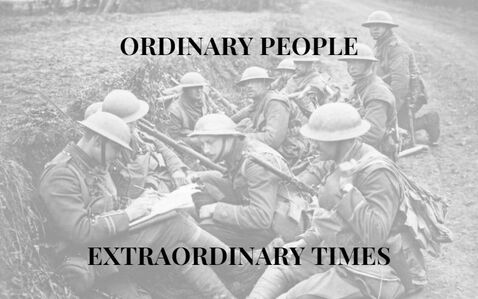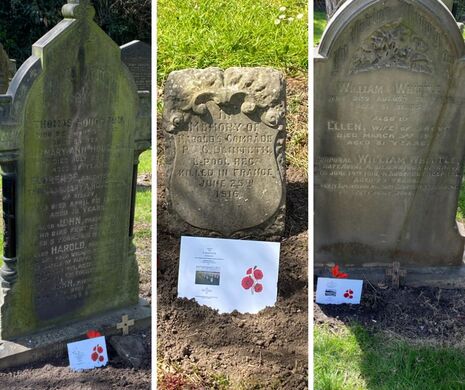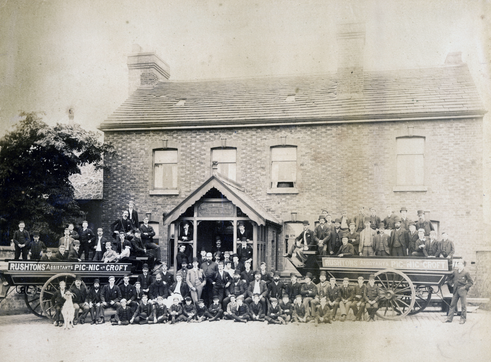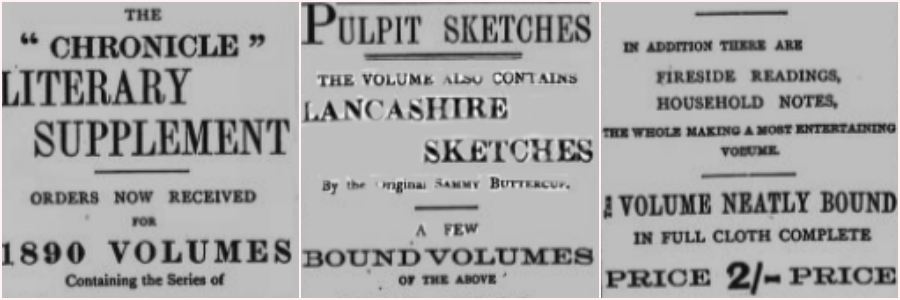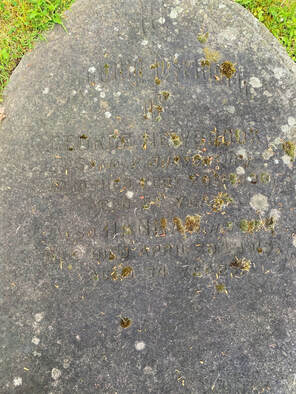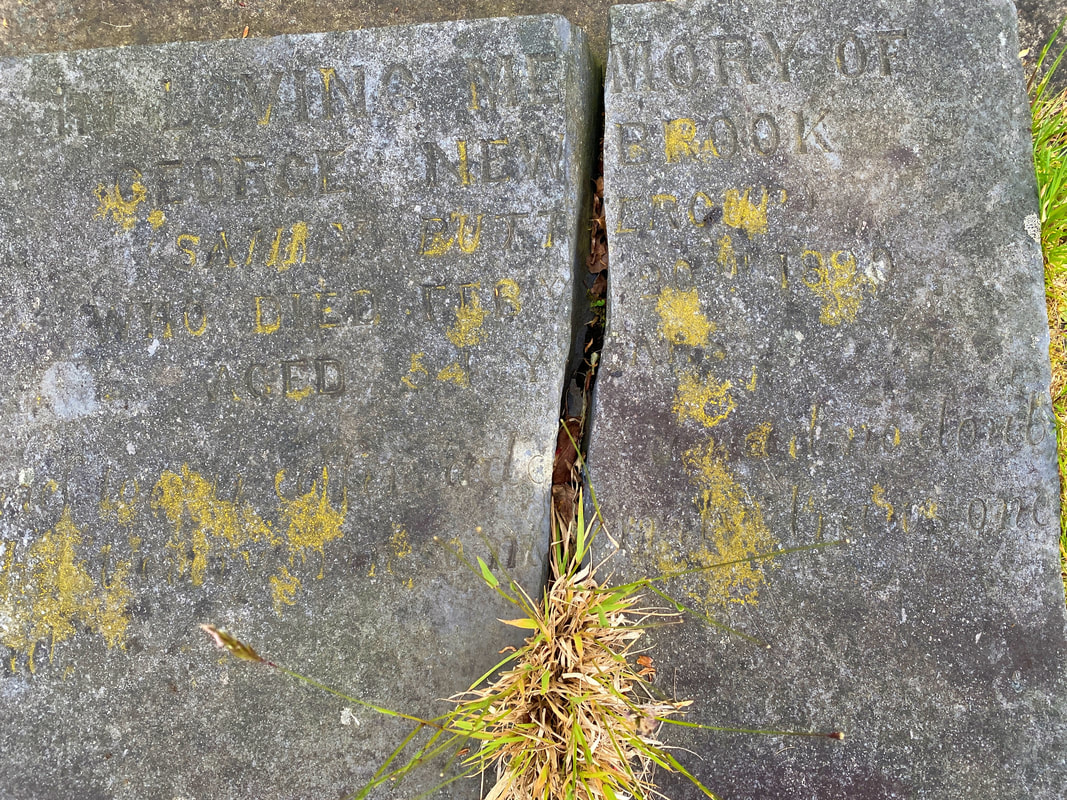WAR GRAVES WEEK 2022War Graves at Croft Unitarian ChapelRifleman Harold HoughtonHarold Houghton was born in 1890 in Croft when his father, Thomas, was 31 and his mother, Mary, was 28. He had four brothers and four sisters.
In 1911 he lived at The Old Noggin Inn, Risley with his parents, his brother and two of his sisters He worked at the Albion Ironworks in Leigh. On 2nd September 1914 he joined the 5th Rifle Brigade, A Company, 2nd Battalion On 24 March 1915 he died of his wounds from the battle of Neuve Chapelle, aged 25. He was buried at Croft Unitarian Chapel, the grave stone stating ‘He Died for his Country’s Honour’. Private George DaintithWhen George Daintith was born on 24 February 1892 in Culcheth, his father, Thomas, was 25 and his mother, Mary, was 21. He was christened at Newchurch on 17th April the same year.
His mother Mary passed away in 1906 and his father remarried in 1907. He had seven brothers and two sisters. In 1911 he lived with his father, stepmother and four of his brothers at The Old Noggin Inn, Risley. In April 1915, he joined Kitchener’s Army, enlisting in the 1st King’s Liverpool Regiment. After about a year’s training he was sent to the Front and was attached to the 251st Company Royal Engineers. He was killed in action on June 25th, 1916, in the ‘great push’ near Albert. Captain Hansen, R.E., in expressing his sympathy with his parents said: ‘Your son met his death on the night of June 25th while doing his duty, and I cannot speak too highly of his behaviour on this occasion, and ever since he joined this Company. I cannot say how deeply I felt his loss to my section, as he was one of my best men and could always be depended upon. He was a typical example of a true British Soldier, and died doing his duty to his King and Country and so great a cause. Your son was buried last night, and I have taken steps to have a cross placed upon his grave.’ A memorial service was held at Newchurch Parish Church on Sunday 23rd July 1916. George is buried in Cambrin Military Cemetery. Harold Houghton’s parents had a stone erected at Croft Unitarian Chapel in Harold’s grave space saying 'Private. George Daintith. In memory of Harold's comrade of the Liverpool Regiment, killed in France 25/06/1916'. Lance Corporal William WhittleWhen William Whittle was born in 1889 in Culcheth, his father, William, was 29 and his mother, Ellen, was 21. He had two brothers.
In 1911 he lived and worked at Oakwood Farm, Risley with his parents and brothers. He died on 14 June 1918 in France at the age of 29 and is buried at Terlincthun British Cemetery, Wimille. He is remembered on the family grave at Croft Unitarian Chapel, the stone stating ‘Duty Nobly Done’. War Graves at Christ Church, CroftGunner Samuel YatesRoyal Garrison Artillery. Died on 9th July 1920, aged 42.
Son of Samuel and Mary Yates; husband of Lizzie Hankin Yates, of Longford Cottages, Longford, Warrington. Private William ClarkeSouth Lancashire Regiment, transferred to as Private 584377, Labour Corps.
On 19th December 1918 he was admitted to the Military Hospital, Warrington with influenza and pneumonia. He passed away at 16:50 hours on the 26th November 1918. His history was of being unwell after he was gassed by mustard gas in France four months prior and he had chest trouble ever since. He was the son of John and was the husband of Bertha, remarried to Andrews, of Little Town, Croft. He had two children, Thomas and Vera. Newchurch War GravesPRIVATE F FAULKNER
South Lancashire Regiment Died 16th March 1918 SERGEANT CYRIL WHITTLE Royal Air Force Volunteer Reserve Died 23rd April 1944 PRIVATE JOHN CLARK PICK Manchester Regiment Died 31st May 1940 PRIVATE JOSHUE RICHARD CLEWORTH King's Own (Royal Lancaster Regiment) Died 25th November 1918 DRUMMER G LOCKE Leinster Regiment Died 8th May 1920 PRIVATE ARTHUR MONKS Royal Army Service Corps Died 18th January 1921 GUARDSMAN HUGH ARTHUR WOOD Welsh Guards Died 29 August 1921 St. Oswald's War GravesPRIVATE W B MIDDLETON
Leicestershire Regiment Died 29th March 1921 SERJEANT JOHN BUCHANAN Royal Army Medical Corps Died 27th October 1918 LEST WE FORGETThe above image has an estimated date of between 1880 and 1890. I came across the below newspaper article describing the re-building of the hotel in 1886, therefore it must have been after that date.
Leigh Chronicle and Weekly District Advertiser
|
|
The original 2' square stone, made of slate, must have been unsuitable from damage and was replaced with the ledger stone. Later, the original was restored and added to the ledger. It has on it the quote:
“Grief to our coffin adds a nail, no doubt; Whilst every grin, so merry, draws one out.” |
LEIGH CHRONICLE & WEEKLY DISTRICT ADVERTISER
FRIDAY 9TH MARCH 1888
LANCASHIRE SKETCHES
No. XXXII – LITTLE BILLY
BY THE ORIGINAL SAMMY BUTTERCUP
Neaw aw may as weel tell yo as heaw Croft's a varry aynshunt place, an th' reeason on't not bein menshund i'th Hist'ry o' Hinglond is bocose thoose ut wrote it didno goo to th' trubble o' payin it a visit to mak enquiries.
Neaw iv yo'll look i' Scriptur yo'll find it sez summat abeawt Moses bein fun i' some bullrushes, but it doesno say eggsactly wheer thoose rushes wur; but, iv aw remember reight, thoose rushes wur asoide o' where th' Booard Skoo is neaw, tho' th' rushes wur taen away mony a year sin to mak porayter hampers on.
Then agean, in another place, yo'll find summat abeawt Jonah swallerin a whale; but that's sich greyt while sin ut thers no trace left i' Croft o' noather Jonah nor t' whale, an th' lond bein plow'd up so mich so as to plant green peighs an carrots, its mich iv they ever find ony trace on't.
In another place yo find it menshund abeawt Jacob's ladder. Neaw thers a greyt mony ladders i' Croft, an they'n getten mixt up so mich ut thers no tellin which wur Jacob's ladder.
Neaw thers an owd smithy at Croft-bin theer monya hunderd year -- an accordin to th' Hist'ry o' Lankesher, it wur at this smithy wheer Oliver Crummell stopt to get shoon put on his hosses when he wur on his rode to Preston. When th' hosses ud getton their shoon on, he marcht his army to Leighth, an ther wur feet marks ov his cannon wheels uppoth hee rode for mony a year after, but thers no trace left on um neaw.
Oliver Crummell stopt o neet at th' King's Arms, Leighth, an th' next mornin, after he'd blown Whalley Abbey deawn, an Windleshaw Abbey, Sant Helen, he marcht his sowgers to l'reston.
Aw'm gettin off mi tale a bit, but as Croft wur a varry nooated place i' owden toimes, an nob'dy seeums to know mich abeawt it at th' present toime, aw think its just as weel to gie my readers a bit ov a descripshun on't.
It's not a varry largely-populated place, an at th'present toime its mooastly populated wi men, wimmin,an childer. Ov course thers a toothri hosses an keaws,an a toothri pigs an fowl, an loikewoise horn'd ponies an a four-legg'd cock, but aw dunno want to enter into nat’ral hist’ry.
Neaw ther's some varry owd inhabitants at Croft - some on ums bin livin theer ever sin they flit fro some-wheer else, au some's lived theer o ther loif-an its varry seldom ut a deeath taks place theer, becose its sich a healthy little spot.
Yo seen they get th' sea breeze fro th' Isle o' Mon every mornin bi t’ fust train, an th' climate theer doesno vary so mich-thermometers theer never goo deawn aboon 90 degrees below zero i'winter, nor aboon 327 n ‘arf i' summer.
Ther isno a doctor for miles, becose they dunno need ony. Thers noather warkheawses, ragged skoos, infirmaries, nor prisons, an th' inhabitants behave theirsels so weel ut it nobbut needs one poleesmon.
Some foak may happen think ut thers no building at Croft nobbut a toothri farm-heawses ; but lemmi tell yo ut thers a grond brewery theer, wi twelve acres ov a orchard attatch'd to't, wheer they con get moor gooseberries i'th seeason nor what ud mak apple dumpling enuf to feed o Lankesher.
Then thers a Church, a Catholic Chapel, a Unitarian Chapel, a Booard Skoo, a Pooast Offis, a Penny Bank, a Burial Society, Horticultural Society, an a Oldfellas' Lodge, but aw conno understond these Oddfellas at o, becose they're welly o married men.
Th' "Charge of the Light Brigade" took place at Croft. Aw dunno meean thoose " noble six hundred, becose ther wur aboon six theausand o' these, an Paddy Flynn wur chargin un wi a leeted candle an a toastin-fork, an it wur set deawn i' hist'ry as th' " Massacre of the Innocents."
Th' Battle o' Wayterloo wur fowten somewhere between Charley Wild's Farm an th' General Elliot Hotel, an th' Hindyun Mutiny took place in a field belungin to Measter Sankey.
Dick Turnip stopt o neet at Croft when he wur on his rode fro Lunnon to York, an th' Mail Coach fro Liverpool to Jerusalem used to stop three days so as th'passengers could goo o' getherin strawberries.
Ther used to be a deol o' weyvin an fustin-cuttin i'Croft, an th' King o' Shanty onest went theer to be mezzerd for a numbrell an a pair o' breeches.
Aw've just dropt across a bit o' poetry abeawt Croft, ut wur written bi oather Lungfella or Shortfella, somewheer abeawt th' toime o'th fust Revolushun i'Seringapotater, so aw'l just gie yo a copy on't :-
CROFT
Thers a little spot co'd Croft,
O, aw've bin theer varry oft,
Its as nice a little spot as e'er wur seen ;
With its ripplin brooks an rills,
With joy my heart it fills,
An its grond i' summer, when its fields are green.
Thers ponies theer wi horns,
A farmer plagued wi corns,
An a cock ut struts abeawt wi four legs ;
A clock i'th frunt o'th skoo,
Tho' too lazy for to goo,
An a duck they sen ut oft lays gowden eggs.
Then thers Polly Ann McGuire,
With a yead as red as foyar,
Thers Paddy Flynn an Jeremy O'Neil ;
An thers little Jonty Roe,
Wi a blister on his toe,
An a greyt big mustard playster on his heel.
Thers a farmer theer wi't gout,
An his woife waynt let him out,
An a widder woman wi a wooden leg,
An then thers Jemmy G .,
Sometoimes he gets on th' spree,
An tho' wealthy oftoimes bacco he will beg.
Thers another chap --- Pee Heyes --
He's a boy for heytin peighs,
An little Sammy Yates goos killin pigs ;
Then thers little Jemmy Shaw,
He loikes a bit o' jaw,
An he's varry fond o' doncin Irish jigs.
An thers Charley Wild -aw'm sure
He is a perfect cure-
But as good a bit o' comp'ny as yo'il find ;
He could tell yo mony a tale
As ud mak yo'r face turn pale,
An he sez keaws' tails are allus hung behind.
Jemmy Johnson keeps a farm,
An he's seven cats i'th barn,
He sez he keeps um theer the rats to scare;
Then thers Roddy wi his gun,
Sometoimes he has some fun --
He one toime kill'd a hedgehog for a hare.
But to mi tale.
Little Billy warks at that smithy " hereinbefore menshund," as th' lawyers sez. He's a varry quiet an daysent soart ov a chap, an aw'm sartin his woife's getten a good husband.
Neaw Billy wauks abeawt two mile to his wark in a mornin an two mile back agean at neet, an he's never missin nobbut when he's absent.
His measter wanted to goo whoam a bit sooner tother day, so he towd Billy to put th' hoss i'th trap, an he went to get a gill o' ale while Billy geet it raddy.
After he'd bin i'th aleheawse abeawt hauve an heawr, he went eawt to see what Billy wur doin, an he fun him stondin theer lookin gradely puzzled.
"Is it raddy yet, Billy ?" th' measter axt.
" Aye, aw think it'll do neaw, " sed Billy.
" But what's this doin here ?" th' measter sed, when he seed th' hoss's collar lyin uppoth floor.
" Why, aw couldno find a place for that," sed Billy, "an aw thowt it ud happen do witheawt."
" But it'll not do witheawt," sed his measter, "look sharp an get it on, becose aw want to be gooin."
" Wheer does it goo!" sed Billy, as he poikt th'collar up an lookt at it.
" Why, it goos on it neck, to be sure," sed his measter, an then he went in for another gill.
Billy pood th' yead gear off th' hoss an tried to put th' collar on, but he kept th' narrow eend up, an for o he kept thrutchin an swattin, an welly shuved th' hoss i'th doytch, he couldno get th' collar o'er it yead.
" Aw'll be heng'd iv aw con understond this," sed Billy to hissel, as he stared fust at th' collar an then th'hoss's vead, "this here's oather gone less or else th'hoss's yead's gone bigger.But it happen doesno goo o'er it yead, " he sed, as a fresh thowt struck him.
Then he took th' hoss eawt o'th trap, an geet booath it hinder legs throo t' collar, an tried to get it on that rode, but it wur no use, for when he geet it up to it tail he couldno get it no furr.
"Its no use tryin, " he sed to hissel, as he clapt th'collar uppoth floor, "thers summat wrang somewheer. Aw darst bet th’ Bank o’ Hinglond, Iv aw had it, ut that hoss wern't mezzer'd for this collar.'
Th' measter coom cawt agean in a bit to see iv trap wur raddy, but it wur just same as it wur afoar.
" Hasn to getten that collar on yet, Billy ?" he sed.
" Nawe, " sed Billy, "an aw'd loike to see th' chap as con put it on.
"Put it on ? Why, it goos on yezzy enuf," sed th' measter, as he geet howd o'th collar and slipt it o'er th' hoss's yead, an Billy stood starein at him loike a thunner-struck grasshopper.
Billy couldno gie o’er thinkin abeawt th' hoss's collar. It wur th' topmost thing in his mind o neet, in fact he actily dreamt abeawt it that neet, geet up in his sleep, an wakken'd th' woife wi tryin to shuve th' hondle o'th kettle o'er her yead.
Then ther wur a gradely flare-up, becose th' woife thowt as heaw he wur tryin to murder her, till Billy wakken'd an towd her abeawt th' hoss's collar.
Heawever, things are o reight agean neaw, an Billy ul know heaw to put a collar on i' futur.
CREWE CHRONICLE
SATURDAY 2ND OCTOBER 1875
Samuel Stretch was charged at the County Police court, Warrington, on Wednesday, with assaulting his wife.
From the evidence it appeared that the defendant, a well-to-do farmer, at Croft, near Warrington, had been drinking heavily for the last two years, and had lately turned his wife out, causing her to sleep in outhouses.
Dr. Spinks and Dr. Fox stated that the defendant was not in a fit state to be able to plead. If he did not change his mode of life, softening of the brain would ensue.
Ultimately, the prosecution withdrew the charge on the above plea, defendant in the meantime to be taken charge of by his friends.
LEIGH JOURNAL AND TIMES
SATURDAY 22ND SEPTEMBER 1877
On Monday, at the Leigh Petty Sessions, Thomas Larney appeared to a summons charging him with overcrowding at Fowley Common, Culcheth.
Mr. Hamilton, inspector of the Leigh Rural Sanitary Authority, deposed that he visited the defendant’s house on the 24th ult., finding in a bedroom, containing only 936 cubic feet of air space, the defendant, his wife, and four children. In the next room, containing 812 feet of air space, there were seven men lodgers.
On the 9th inst., at a quarter past eleven at night he found eight men in the last named room, and as he entered a ninth was making his exit through the window.
The stench in the place was unbearable, there being no room in the house for lodgers.
The Bench inflicted a fine of 21s. and costs, or one month in default, and ordered that no lodgers be kept hereafter.
James Marsh was summoned under the Nuisance Removal Act, a petty and two pigstyes being built against his property at Fowley Common.
The Bench made an order for the immediate abatement of the nuisance.
LIVERPOOL ECHO
WEDNESDAY 3RD AUGUST 1892
Today is the date for the Warrington County Petty Sessions. The magistrates were Mr. John Crosfield (in the chair) and Mr. J. J. Bleekly.
The Magistrates Clerk (Mr. Henry Greenall) said that there were no cases to be heard, and it gave him great pleasure to present the chairman with a pair of white kid gloves.
Mr. Crosfield, in reply, thanked Mr. Greenall, and said that he was very pleased that Warrington and the surrounding district were in such an excellent condition, and he hoped that there would be no more cases for the next twelve months.
Mr. Bleekly also congratulated Mr. Crosfield. Mr. Crosfield said he did not think this had ever happened to borough magistrates. Police Constable Chantler, of the Warrington borough police force, said that he never remembered such an occasion. – The borough magistrates sit six days in the week unless, as sometimes happens, there are no cases to be dealt with. The county magistrates sit the first and third Wednesdays in the month, and exercise a jurisdiction over the following townships: - Warrington (extra-municipal), Poulton, Rixton with Glazebrook, Southworth with Croft, Houghton, Culcheth, Cuerdly, Penketh, Sankey and Burtonwood.
Many crimes however minor they seem today were punishable by death. On the few occasions the judges didn’t have to sentence the defendant to death, the sheriff of the county presented judges with a pair of white gloves as a symbol of the purity of the county.
As our Criminal law became much less cruel and death as a sentence much less common during the 19th century the custom was adapted so judges were only presented with White gloves if there was no serious crime at all.
Author
Cheyvonne Bower
I am a local and family historian with a passion for the past.
I am a member of the
Manchester & Lancashire Family History Society.
Archives
July 2024
June 2024
April 2024
March 2024
February 2024
January 2024
November 2023
August 2023
April 2023
March 2023
December 2022
November 2022
October 2022
September 2022
August 2022
May 2022
April 2022
March 2022
February 2022
January 2022
Categories
All
Christ Church
Civil War
Crime And Punishment
Croft In The News
Croft Then And Now
Croft Unitarian Chapel
Culcheth
Health
Information
Irlam
Leisure
Listed Buildings
Maps
Newspapers
On This Day
People
Public Houses
Risley Chapel
Winwick

